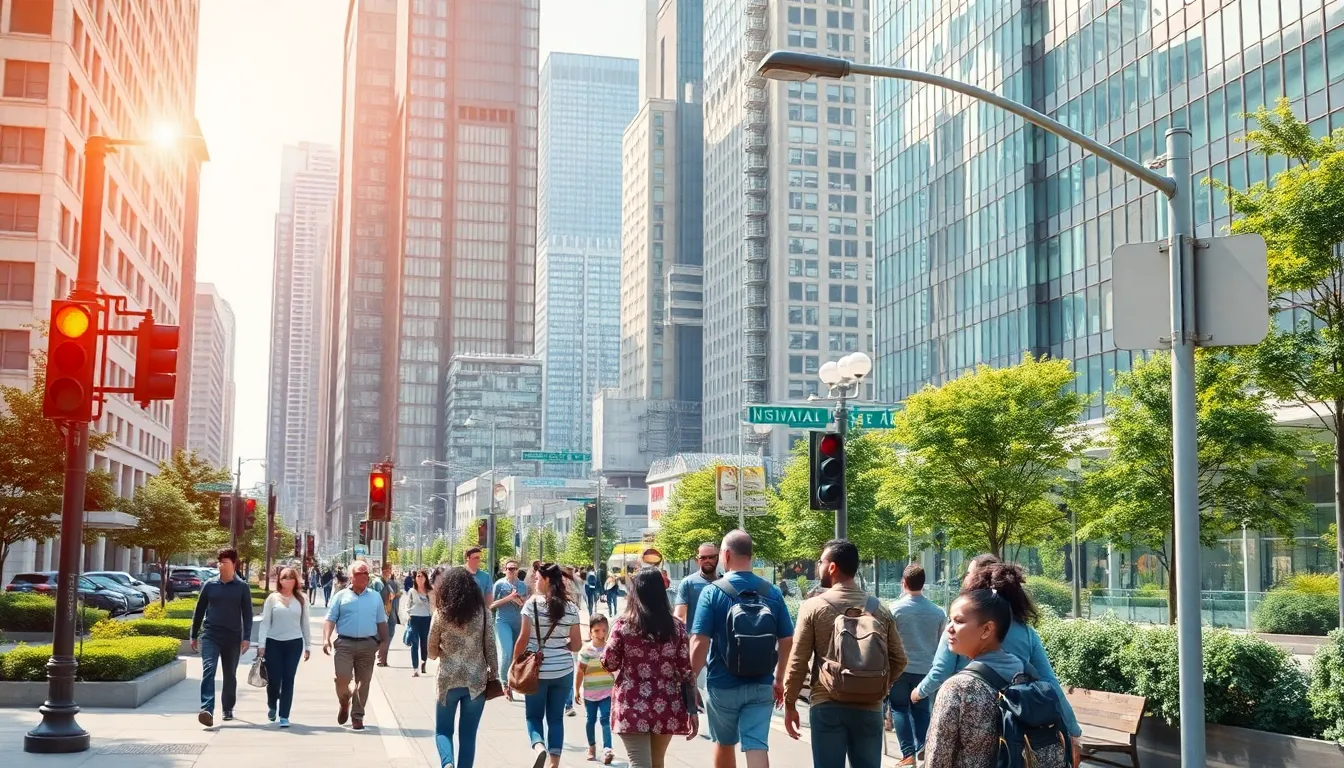As urban populations continue to surge, cities face unprecedented challenges in managing resources, infrastructure, and services. Enter artificial intelligence, a game-changer that’s transforming how urban environments operate. By harnessing data and advanced algorithms, AI is paving the way for smarter cities that enhance the quality of life for residents while promoting sustainability.
From traffic management to energy efficiency, AI technologies are revolutionizing city planning and operations. They enable real-time decision-making, streamline public services, and foster community engagement. As cities embrace these innovations, they not only become more efficient but also more resilient in the face of future challenges. The integration of AI in smart cities is not just a trend; it’s a necessary evolution for creating livable urban spaces.
Table of Contents
ToggleOverview of AI in Smart Cities
Artificial intelligence (AI) plays a critical role in transforming urban areas into smart cities. Smart cities utilize interconnected technology to enhance urban living, optimize resource management, and streamline services.
Definition of Smart Cities
Smart cities integrate digital technology into urban planning and management. They use sensors, data analytics, and IoT (Internet of Things) devices to gather information about various urban systems. Examples include traffic flow sensors and air quality monitoring stations. By leveraging this data, cities can create innovative solutions that address challenges such as congestion, pollution, and energy consumption.
Importance of AI Technologies
AI technologies enhance smart city frameworks by enabling data-driven decision-making and automation. AI algorithms analyze vast data sets from city infrastructure, leading to improved traffic flow and reduced travel time. AI-based predictive models optimize energy grids, accommodating fluctuating demands and preventing blackouts. Additionally, AI-powered systems improve safety by enhancing public surveillance and emergency response capabilities, contributing to overall urban resilience and efficiency.
Applications of AI in Smart Cities

AI significantly enhances the functionality of smart cities across various domains. These applications address critical urban challenges while improving the quality of life for residents.
Traffic Management Solutions
AI optimizes traffic flow through real-time data analysis and predictive modeling. Intelligent traffic signals adapt to traffic patterns, reducing congestion and minimizing delays. AI-enabled navigation apps provide drivers with the quickest routes, while traffic predictions help city planners manage infrastructure needs. Sensor technology gathers real-time information about vehicle counts and speeds, further improving traffic management efficacy.
Energy Efficiency Initiatives
AI helps cities reduce energy consumption and decrease carbon emissions. Smart grids utilize AI to analyze energy usage patterns, enabling better demand forecasting and energy distribution. AI algorithms can optimize streetlight systems, adjusting brightness based on environmental conditions and activity levels, thereby conserving energy. Additionally, AI monitors HVAC (heating, ventilation, and air conditioning) systems in public buildings for improved efficiency and reduced operational costs.
Public Safety Enhancements
AI bolsters public safety through enhanced surveillance and emergency response systems. AI-powered cameras recognize suspicious activities, alerting authorities in real-time. Predictive analytics assess crime patterns, leading to proactive policing strategies. Moreover, AI aids emergency response teams by optimizing routing for ambulances and fire trucks, ensuring faster response times during critical incidents. Smart city platforms integrate data from various sources, equipping officials with the information needed to address safety concerns effectively.
Challenges in Implementing AI
Implementing AI in smart cities presents several challenges that require careful consideration and strategic approaches. Addressing these challenges is essential for maximizing the benefits of AI technologies in urban settings.
Data Privacy Concerns
Data privacy concerns arise due to the extensive data collection involved in AI systems. Cities gather information from various sources, including sensors, cameras, and IoT devices, which can include personal data. Ensuring data protection requires robust security measures and transparency in data usage. Cities face the risk of data breaches that compromise residents’ privacy, necessitating compliance with regulations such as the General Data Protection Regulation (GDPR). Effective data anonymization techniques and consent mechanisms can help mitigate these risks.
Infrastructure Limitations
Infrastructure limitations pose significant challenges to the deployment of AI in smart cities. Many urban environments lack the necessary digital infrastructure to support advanced technologies. Insufficient bandwidth, outdated hardware, and inadequate power supply hinder the implementation of AI solutions. Upgrading existing infrastructure requires substantial investment and long-term planning. Solutions may involve establishing high-speed internet connectivity, implementing smart grids, and enhancing data storage capabilities to facilitate AI applications across urban systems.
Regulatory Issues
Regulatory issues can complicate the integration of AI technologies in smart cities. Diverse regulations across different jurisdictions create a complex compliance landscape. Urban planners and policymakers must navigate varying local, state, and federal regulations governing AI use, data security, and public safety. Collaboration among stakeholders can streamline regulatory frameworks, ensuring that AI deployments align with public interests and ethical standards. Additionally, fostering dialogue with community members can clarify concerns and lead to more effective policies regarding AI integration.
Case Studies of Successful Implementations
Several cities worldwide exemplify successful AI integration in their smart city initiatives, showcasing innovative solutions that address urban challenges.
Example from a Major City
Barcelona implemented an AI-driven traffic management system that utilizes real-time data from IoT sensors to monitor congestion levels. The system adjusts traffic signals dynamically, optimizing flow and reducing average travel times by 20%. Moreover, AI algorithms analyze historical and real-time data, predicting peak traffic periods, allowing for proactive measures that alleviate congestion before it escalates. The city’s waste management also benefits from AI, employing smart bins that use sensors to notify collection services when they reach capacity, ensuring efficient operations and reduced fuel consumption.
Lessons Learned from Pilot Projects
Pilot projects in various cities reveal critical insights into successful AI deployments. First, stakeholder engagement proves vital: involving community members early fosters trust and addresses concerns about privacy and security. Second, robust data-sharing practices enhance AI systems’ effectiveness: integrating data from multiple sources allows for comprehensive analysis and more informed decision-making. Third, incremental implementation minimizes risks: starting with small-scale projects enables cities to troubleshoot issues and refine AI systems before broader deployment. Finally, continuous evaluation ensures adaptability: cities must evaluate AI performance regularly and update systems based on real-world results and community feedback.
Future Trends in AI and Smart Cities
The integration of AI into smart city frameworks continues to evolve, driving significant advancements in urban management. Emerging technologies and predictive analytics shape the future trajectory of AI applications in urban environments.
Emerging Technologies
Artificial intelligence in smart cities increasingly relies on several emerging technologies.
- Edge Computing: Reduces response time by processing data closer to the source, enhancing real-time decision-making in traffic management and public safety.
- 5G Connectivity: Expands capacity for massive data transfer, enabling more extensive use of IoT devices and seamless integration of AI algorithms.
- Machine Learning: Improves predictive analytics, allowing cities to anticipate traffic patterns, energy consumption, and potential emergency scenarios more effectively.
- Blockchain Technology: Secures data transactions and improves transparency in smart city systems, facilitating trust in automated services and reinforcing data privacy.
These technologies work together, providing a robust framework for AI applications that enhance the functionality and efficiency of urban environments.
Predictions for Development
Predictions for the development of AI in smart cities point towards increased sophistication and adoption.
- Hyper-Personalized Services: AI systems are likely to tailor services based on individual preferences and behaviors, optimizing public transportation options, energy usage, and personalized emergency alerts.
- Greater Interoperability: Future smart cities will feature interconnected systems, allowing seamless data exchange between different services and applications, improving overall city management.
- Enhanced Sustainability Initiatives: AI will drive innovative solutions that address climate challenges through waste reduction, energy efficiency, and sustainable urban planning practices.
- Expanding Community Engagement: AI tools will facilitate greater participation from citizens in decision-making processes, leveraging data and analytics to reflect community needs and priorities.
These predictions illustrate a continuing commitment to leveraging AI for the benefit of urban dwellers, driving toward smarter, more sustainable cities.
AI’s integration into smart cities is revolutionizing urban living by addressing critical challenges and enhancing the quality of life for residents. As cities continue to grow, the role of AI becomes increasingly vital in optimizing resource management and improving public services. The potential for smarter traffic systems, energy-efficient infrastructures, and enhanced public safety illustrates how AI can reshape urban environments.
While the journey toward fully realizing smart cities is fraught with challenges, the collaboration among stakeholders and commitment to ethical standards can pave the way for successful implementation. Embracing emerging technologies will further propel cities into a future where sustainability and innovation go hand in hand. The path ahead is promising, as AI continues to drive urban transformation and create more resilient communities.







